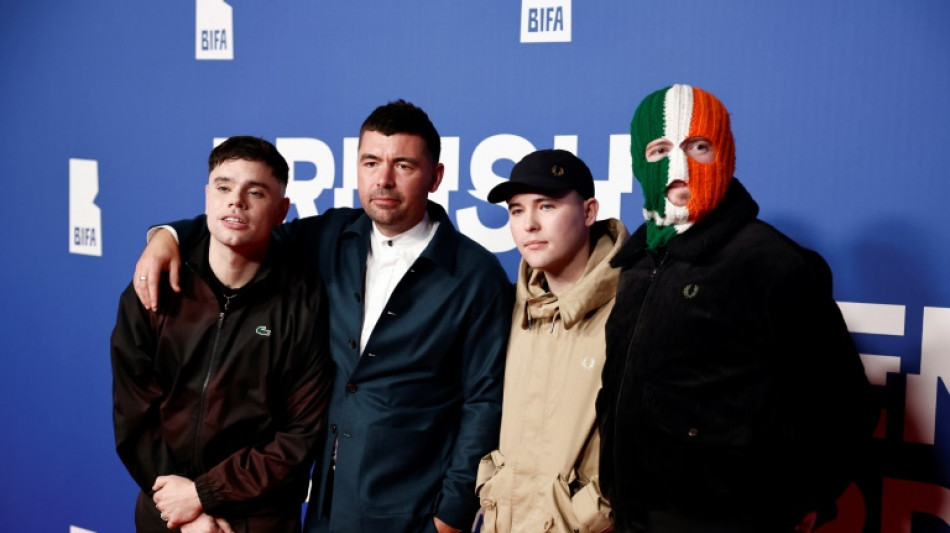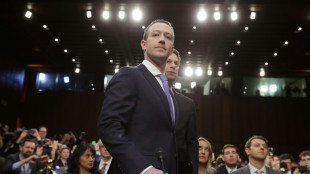

Kneecap 'unfazed' by legal problems, says friend and director
Irish rappers Kneecap are "unfazed" by their legal problems and controversies kicked up by their anti-Israel pro-Palestinian statements, friend and film director Rich Peppiatt told AFP.
Peppiatt helped create the Kneecap phenomenon with his 2024 semi-fictionalised film about the hip-hop group from Belfast, who are now playing major festivals around the world.
The trio made headlines by projecting the words "Fuck Israel, Free Palestine" during their gig at US festival Coachella in April, while lyricist Mo Chara is set to appear in a London court on a terror charge on Wednesday.
Chara, whose real name is Liam Og O Hannaidh, is accused of displaying a flag of Lebanon-based and anti-Israel militant group Hezbollah -- a banned organisation -- at a gig last year.
"Even through all the controversy at the moment, they just shrug their shoulders and get on with it," Peppiatt told AFP. "They are just completely unfazed by anything."
The former journalist first encountered Kneecap in a pub in Belfast in 2019 and was struck by their local fanbase, eventually convincing Chara, Moglai Bap and DJ Provai to appear in the movie about their lives.
"They've always been controversial at a local level, and they've always bounced back from it," Peppiatt continued.
"The amount of times in the last six years I've heard 'that's the end of Kneecap' because of something they've said or done, and all it's done is propelled them to the next level," he said.
- British colonialism -
Kneecap started out as an overtly political project, with the group singing in Irish in defence of their language and protesting British rule in Northern Ireland.
Their high-energy gigs, prolific drug-taking and the violent undercurrent of Belfast life were captured in Peppiatt's film "Kneecap", which premiered at the Sundance film festival in 2024 to rave reviews.
The dark comedy, music and occasional surrealist digression means it has been frequently compared to 1996 hit "Trainspotting", which Peppiatt mentions as an influence.
Drawing an estimated six million people to cinemas worldwide on a budget of just £3 million ($4 million), it was a debut hit for the London-born director.
"You certainly don't make a film about an Irish-language rap band no one's heard of, and who have never released an album, thinking it's going to be a hit," Peppiatt, who recently obtained Irish nationality through his wife, told AFP.
But he says it tapped into larger themes that people identify with, from the loss of local languages to the struggle in many countries against colonial-era influences.
"One useful thing about British colonialism is that when you've taken over a third of the world, if you make a film 50 or 100 years later, and it's all about 'fuck the British', you find an audience for it," he joked.
As for the question of whether his film created Kneecap the band, or whether the band made his film, he said it was a bit of both.
"I felt that they were going to break through. Obviously the film's accelerated that," he said.
Kneecap the film will hit screens in France and South Korea on Wednesday in the final stages of its international release.
- Palestinian cause -
Kneecap's support for the Palestinian cause and their denunciation of Israel's devastating war in Gaza, Peppiatt said, was in line with Irish public opinion.
"There's always been a very close connection between the Irish cause and the Palestinian cause," he said. "Where they're from in West Belfast, there are as many Irish flags as there are Palestinian flags."
But critics see the group as going too far and accuse them of embracing violent extremists.
One video of a gig appears to show a band member shouting "Up Hamas, up Hezbollah".
Another from a 2023 performance, which was also assessed by British police, appears to show one of them urging fans to kill British lawmakers, leading to a public apology to the families of murdered MPs.
Kneecap have called on fans to show up outside court on Wednesday in support of Chara and have labelled his prosecution "political policing".
Peppiatt told AFP he did not always agree with the way the group expressed themselves.
"Where they slipped up for me at Coachella was saying 'fuck Israel', that's a very broad statement to make that incorporated a lot of people who don't believe in what's happening there (in Gaza)," he said.
"When you're friends with people you're allowed to disagree, and I do disagree with them on some things."
F.Tsakiris--AN-GR



